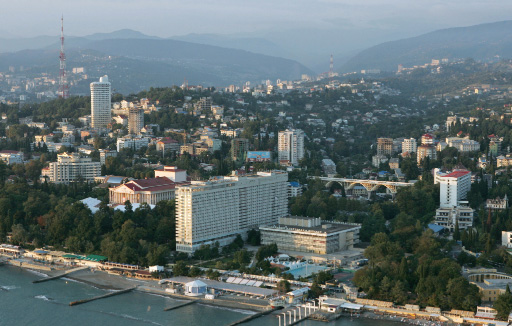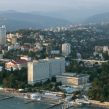
Multiple Problems Plague Kremlin Plans for 2014 Sochi Olympic Games
Publication: Eurasia Daily Monitor Volume: 7 Issue: 103
By:

On May 21, protest actions and tributes to the war victims of the Russia-Circassian war took place worldwide. Marking 146 years since the end of the war in 1864, Circassian activists took to the streets in Turkey, the United States, Europe and Israel, where there are substantial diasporas of the ethnic Circassians. Circassians argue that Sochi, where Moscow plans to hold the 2014 Winter Olympic Games, is a land of genocide, where the Russian army slaughtered the civilian Circassian population en masse (nosochi2014.com, May 22). The bulk of the remaining Circassian population, up to 90%, was deported to the Ottoman Empire. Circassian activists are now trying to utilize the world’s attention to the Sochi Olympics to elevate the impact of their demands for apologies and concessions from the Russian government.
Significant numbers of ethnic Circassians live in Adygea, Karachay-Cherkessia and Kabardino-Balkaria in the western part of the North Caucasus, adjacent to the future Olympic sites. Potential destabilization in these regions could prove fatal to what is believed to be Russian Prime Minister Putin’s plan to hold the 2014 Olympic Games in Sochi. The scale of violence in the North Caucasus, even without Circassian demands, is very high with daily attacks reported from Ingushetia, Dagestan, Chechnya and increasingly so from the Circassian-populated republics.
However, the Circassian issue is not the only obstacle to the 2014 Sochi Olympic Games. On May 19, ten people living around areas in Sochi that had been designated as future Olympic sites went on a hunger strike, demanding meetings with Russian President Dmitry Medvedev and Russian Prime Minister Vladimir Putin. The protestors asked for increases of compensation and better quality housing provided by the government for the resettlement (kavkaz-uzel.ru, May 19). People who live in 614 detached houses and 38 apartment blocks should be resettled according to the government program to free up enough space for the Olympic sites. Some of these people do not want to move to other places at all, even though the local government hopes to resettle everyone in 2011 (Kommersant-Daily, April 28).
Russian Vice-Prime Minister Dmitry Kozak is overseeing the Sochi Olympics building program and he has sought to reassure members of the Russian parliament that construction work is proceeding as planned, but experts have expressed their doubts about the government’s excessive optimism. “Daily expenditures on construction exceed $5 million, around 2,500 truck loads are taken each day and the construction program consists of 923 objects. The organizers of the Olympic construction works simply have no experience of implementing such large-scale projects. This fact is bound to have an impact on timeliness and quality of the construction,” said Andrei Serpilin, a partner of the American accounting firm BOD. Approximately $6.8 billion of government and private investors’ money was spent on Sochi in 2009 and the same sum of money will be spent in the current year, noted the Russian newspaper Kommersant (Kommersant-Daily, April 28).
The enormous expenses incurred by the Sochi Olympics make it by far the most expensive winter Olympics games yet. Most of the expenses are covered by government funds that have become scarcer because of the ongoing global economic crisis. Russian opposition group Solidarnost conservatively estimates the costs of the Olympics at $15 billion, an amount that is seven times higher than the cost estimates for the last Olympic Games in Vancouver. The high costs of the Olympics in Sochi are explained by corruption, difficult terrain, but also by the fact that Sochi did not have any readily available infrastructure for winter sports (Rusolidarnost.ru, May 26). The strange irony of the situation is that Sochi is the warmest place in Russia and was chosen for the winter Olympics because, in comparison to the ailing cities across Russia, it has great visual appeal. Being the only warm and relatively safe seaside resort in Russia, it received substantial private investment that is reflected in its appearance.
The reverse side of the hurried construction not only has a human dimension, but also an environmental one. Greenpeace and the World Wildlife Federation (WWF) have fiercely criticized the damage that has been inflicted on wildlife in the region. A joint mission of UNESCO and IUCN (International Union for Conservation of Nature) visited Sochi from May 18-21 to discuss the impact of construction work on the region. The “Western Caucasus” which includes areas in Adygea and around Sochi was designated by UNESCO and IUCN as the object of the world natural heritage in 1999. After UNESCO and IUCN visited the region in 2008 the authorities slowed down their incursions onto these areas, but they still require careful attention from world community organizations (ewnc.org, May 18). Earlier in January the U.N. Environmental Protection agency criticized the implementation of the building plans in Sochi and provided recommendations for the Russian government to improve the situation there (Nezavisimaya Gazeta, March 17).
As the mounting costs of the Olympics increasingly draw public attention, Kommersant-Vlast magazine published on May 24 a lengthy article on the history of the 1980 Moscow Olympics and specifically how the end price of that Olympics exceeded initial projections by nearly five times. Costs were so prohibitive that the Soviet leadership even considered canceling the Olympics altogether. Observers wonder whether the Sochi Olympics may potentially be canceled due to a number of financial and political constraints.
Regardless of Moscow’s plans, a mounting array of problems are emerging for the Russian organizers of the Sochi Olympics as constructions costs, infrastructure problems, and Circassian activism raise the high price for what many believe to be the personal project of Vladimir Putin.




